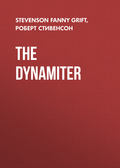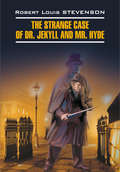
Роберт Льюис Стивенсон
New Arabian Nights
While he was thus unpleasantly reflecting, the arras that overhung the chapel door was raised, and a tall priest in his robes came forth and, giving a long, keen stare at Denis, said something in an undertone to Sire de Malétroit.
“She is in a better frame of spirit?” asked the latter.
“She is more resigned, messire,” replied the priest.
“Now the Lord help her, she is hard to please!” sneered the old gentleman. “A likely stripling – not ill-born – and of her own choosing, too? Why, what more would the jade have?”
“The situation is not usual for a young damsel,” said the other, “and somewhat trying to her blushes.”
“She should have thought of that before she began the dance. It was none of my choosing, God knows that: but since she is in it, by our Lady, she shall carry it to the end.” And then addressing Denis, “Monsieur de Beaulieu,” he asked, “may I present you to my niece? She has been waiting your arrival, I may say, with even greater impatience than myself.”
Denis had resigned himself with a good grace – all he desired was to know the worst of it as speedily as possible; so he rose at once, and bowed in acquiescence. The Sire de Malétroit followed his example and limped, with the assistance of the chaplain’s arm, towards the chapel door. The priest pulled aside the arras, and all three entered. The building had considerable architectural pretensions. A light groining sprang from six stout columns, and hung down in two rich pendants from the centre of the vault. The place terminated behind the altar in a round end, embossed and honeycombed with a superfluity of ornament in relief, and pierced by many little windows shaped like stars, trefoils, or wheels. These windows were imperfectly glazed, so that the night air circulated freely in the chapel. The tapers, of which there must have been half a hundred burning on the altar, were unmercifully blown about; and the light went through many different phases of brilliancy and semi-eclipse. On the steps in front of the altar knelt a young girl richly attired as a bride. A chill settled over Denis as he observed her costume; he fought with desperate energy against the conclusion that was being thrust upon his mind; it could not – it should not – be as he feared.
“Blanche,” said the Sire, in his most flute-like tones, “I have brought a friend to see you, my little girl; turn round and give him your pretty hand. It is good to be devout; but it is necessary to be polite, my niece.”
The girl rose to her feet and turned towards the new comers. She moved all of a piece; and shame and exhaustion were expressed in every line of her fresh young body; and she held her head down and kept her eyes upon the pavement, as she came slowly forward. In the course of her advance, her eyes fell upon Denis de Beaulieu’s feet – feet of which he was justly vain, be it remarked, and wore in the most elegant accoutrement even while travelling. She paused – started, as if his yellow boots had conveyed some shocking meaning – and glanced suddenly up into the wearer’s countenance. Their eyes met; shame gave place to horror and terror in her looks; the blood left her lips; with a piercing scream she covered her face with her hands and sank upon the chapel floor.
“That is not the man!” she cried. “My uncle, that in not the man!”
The Sire de Malétroit chirped agreeably. “Of course not,” he said; “I expected as much. It was so unfortunate you could not remember his name.”
“Indeed,” she cried, “indeed, I have never seen this person till this moment – I have never so much as set eyes upon him – I never wish to see him again. Sir,” she said, turning to Denis, “if you are a gentleman, you will bear me out. Have I ever seen you – have you ever seen me – before this accursed hour?”
“To speak for myself, I have never had that pleasure,” answered the young man. “This is the first time, messire, that I have met with your engaging niece.”
The old gentleman shrugged his shoulders.
“I am distressed to hear it,” he said. “But it is never too late to begin. I had little more acquaintance with my own late lady ere I married her; which proves,” he added with a grimace, “that these impromptu marriages may often produce an excellent understanding in the long-run. As the bridegroom is to have a voice in the matter, I will give him two hours to make up for lost time before we proceed with the ceremony.” And he turned towards the door, followed by the clergyman.
The girl was on her feet in a moment. “My uncle, you cannot be in earnest,” she said. “I declare before God I will stab myself rather than be forced on that young man. The heart rises at it; God forbids such marriages; you dishonour your white hair. Oh, my uncle, pity me! There is not a woman in all the world but would prefer death to such a nuptial. Is it possible,” she added, faltering – “is it possible that you do not believe me – that you still think this” – and she pointed at Denis with a tremor of anger and contempt – “that you still think this to be the man?”
“Frankly,” said the old gentleman, pausing on the threshold, “I do. But let me explain to you once for all, Blanche de Malétroit, my way of thinking about this affair. When you took it into your head to dishonour my family and the name that I have borne, in peace and war, for more than three-score years, you forfeited, not only the right to question my designs, but that of looking me in the face. If your father had been alive, he would have spat on you and turned you out of doors. His was the hand of iron. You may bless your God you have only to deal with the hand of velvet, mademoiselle. It was my duty to get you married without delay. Out of pure goodwill, I have tried to find your own gallant for you. And I believe I have succeeded. But before God and all the holy angels, Blanche de Malétroit, if I have not, I care not one jack-straw. So let me recommend you to be polite to our young friend; for upon my word, your next groom may be less appetising.”
And with that he went out, with the chaplain at his heels; and the arras fell behind the pair.
The girl turned upon Denis with flashing eyes.
“And what, sir,” she demanded, “may be the meaning of all this?”
“God knows,” returned Denis gloomily. “I am a prisoner in this house, which seems full of mad people. More I know not; and nothing do I understand.”
“And pray how came you here?” she asked.
He told her as briefly as he could. “For the rest,” he added, “perhaps you will follow my example, and tell me the answer to all these riddles, and what, in God’s name, is like to be the end of it.”
She stood silent for a little, and he could see her lips tremble and her tearless eyes burn with a feverish lustre. Then she pressed her forehead in both hands.
“Alas, how my head aches!” she said wearily – “to say nothing of my poor heart! But it is due to you to know my story, unmaidenly as it must seem. I am called Blanche de Malétroit; I have been without father or mother for – oh! for as long as I can recollect, and indeed I have been most unhappy all my life. Three months ago a young captain began to stand near me every day in church. I could see that I pleased him; I am much to blame, but I was so glad that any one should love me; and when he passed me a letter, I took it home with me and read it with great pleasure. Since that time he has written many. He was so anxious to speak with me, poor fellow! and kept asking me to leave the door open some evening that we might have two words upon the stair. For he knew how much my uncle trusted me.” She gave something like a sob at that, and it was a moment before she could go on. “My uncle is a hard man, but he is very shrewd,” she said at last. “He has performed many feats in war, and was a great person at court, and much trusted by Queen Isabeau in old days. How he came to suspect me I cannot tell; but it is hard to keep anything from his knowledge; and this morning, as we came from mass, he took my hand in his, forced it open, and read my little billet, walking by my side all the while. When he had finished, he gave it back to me with great politeness. It contained another request to have the door left open; and this has been the ruin of us all. My uncle kept me strictly in my room until evening, and then ordered me to dress myself as you see me – a hard mockery for a young girl, do you not think so? I suppose, when he could not prevail with me to tell him the young captain’s name, he must have laid a trap for him: into which, alas! you have fallen in the anger of God. I looked for much confusion; for how could I tell whether he was willing to take me for his wife on these sharp terms? He might have been trifling with me from the first; or I might have made myself too cheap in his eyes. But truly I had not looked for such a shameful punishment as this! I could not think that God would let a girl be so disgraced before a young man. And now I have told you all; and I can scarcely hope that you will not despise me.”
Denis made her a respectful inclination.
“Madam,” he said, “you have honoured me by your confidence. It remains for me to prove that I am not unworthy of the honour. Is Messire de Malétroit at hand?”
“I believe he is writing in the salle without,” she answered.
“May I lead you thither, madam?” asked Denis, offering his hand with his most courtly bearing.
She accepted it; and the pair passed out of the chapel, Blanche in a very drooping and shamefast condition, but Denis strutting and ruffling in the consciousness of a mission, and the boyish certainty of accomplishing it with honour.
The Sire de Malétroit rose to meet them with an ironical obeisance.
“Sir,” said Denis, with the grandest possible air, “I believe I am to have some say in the matter of this marriage; and let me tell you at once, I will be no party to forcing the inclination of this young lady. Had it been freely offered to me, I should have been proud to accept her hand, for I perceive she is as good as she is beautiful; but as things are, I have now the honour, messire, of refusing.”
Blanche looked at him with gratitude in her eyes; but the old gentleman only smiled and smiled, until his smile grew positively sickening to Denis.
“I am afraid,” he said, “Monsieur de Beaulieu, that you do not perfectly understand the choice I have to offer you. Follow me, I beseech you, to this window.” And he led the way to one of the large windows which stood open on the night. “You observe,” he went on, “there is an iron ring in the upper masonry, and reeved through that, a very efficacious rope. Now, mark my words; if you should find your disinclination to my niece’s person insurmountable, I shall have you hanged out of this window before sunrise. I shall only proceed to such an extremity with the greatest regret, you may believe me. For it is not at all your death that I desire, but my niece’s establishment in life. At the same time, it must come to that if you prove obstinate. Your family, Monsieur de Beaulieu, is very well in its way; but if you sprang from Charlemagne, you should not refuse the hand of a Malétroit with impunity – not if she had been as common as the Paris road – not if she were as hideous as the gargoyle over my door. Neither my niece nor you, nor my own private feelings, move me at all in this matter. The honour of my house has been compromised; I believe you to be the guilty person; at least you are now in the secret; and you can hardly wonder if I request you to wipe out the stain. If you will not, your blood be on your own head! It will be no great satisfaction to me to have your interesting relics kicking their heels in the breeze below my windows; but half a loaf is better than no bread, and if I cannot cure the dishonour, I shall at least stop the scandal.”
There was a pause.
“I believe there are other ways of settling such imbroglios among gentlemen,” said Denis. “You wear a sword, and I hear you have used it with distinction.”
The Sire de Malétroit made a signal to the chaplain, who crossed the room with long silent strides and raised the arras over the third of the three doors. It was only a moment before he let it fall again; but Denis had time to see a dusky passage full of armed men.
“When I was a little younger, I should have been delighted to honour you, Monsieur de Beaulieu,” said Sire Alain; “but I am now too old. Faithful retainers are the sinews of age, and I must employ the strength I have. This is one of the hardest things to swallow as a man grows up in years; but with a little patience, even this becomes habitual. You and the lady seem to prefer the salle for what remains of your two hours; and as I have no desire to cross your preference, I shall resign it to your use with all the pleasure in the world. No haste!” he added, holding up his hand, as he saw a dangerous look come into Denis de Beaulieu’s face. “If your mind revolts against hanging, it will be time enough two hours hence to throw yourself out of the window or upon the pikes of my retainers. Two hours of life are always two hours. A great many things may turn up in even as little a while as that. And, besides, if I understand her appearance, my niece has still something to say to you. You will not disfigure your last hours by a want of politeness to a lady?”
Denis looked at Blanche, and she made him an imploring gesture.
It is likely that the old gentleman was hugely pleased at this symptom of an understanding; for he smiled on both, and added sweetly: “If you will give me your word of honour, Monsieur de Beaulieu, to await my return at the end of the two hours before attempting anything desperate, I shall withdraw my retainers, and let you speak in greater privacy with mademoiselle.”
Denis again glanced at the girl, who seemed to beseech him to agree.
“I give you my word of honour,” he said.
Messire de Malétroit bowed, and proceeded to limp about the apartment, clearing his throat the while with that odd musical chirp which had already grown so irritating in the ears of Denis de Beaulieu. He first possessed himself of some papers which lay upon the table; then he went to the mouth of the passage and appeared to give an order to the men behind the arras; and lastly he hobbled out through the door by which Denis had come in, turning upon the threshold to address a last smiling bow to the young couple, and followed by the chaplain with a hand-lamp.
No sooner were they alone than Blanche advanced towards Denis with her hands extended. Her face was flushed and excited, and her eyes shone with tears.
“You shall not die!” she cried, “you shall marry me after all.”
“You seem to think, madam,” replied Denis, “that I stand much in fear of death.”
“Oh no, no,” she said, “I see you are no poltroon. It is for my own sake – I could not bear to have you slain for such a scruple.”
“I am afraid,” returned Denis, “that you underrate the difficulty, madam. What you may be too generous to refuse, I may be too proud to accept. In a moment of noble feeling towards me, you forgot what you perhaps owe to others.”
He had the decency to keep his eyes upon the floor as he said this, and after he had finished, so as not to spy upon her confusion. She stood silent for a moment, then walked suddenly away, and falling on her uncle’s chair, fairly burst out sobbing. Denis was in the acme of embarrassment. He looked round, as if to seek for inspiration, and seeing a stool, plumped down upon it for something to do. There he sat, playing with the guard of his rapier, and wishing himself dead a thousand times over, and buried in the nastiest kitchen-heap in France. His eyes wandered round the apartment, but found nothing to arrest them. There were such wide spaces between the furniture, the light fell so baldly and cheerlessly over all, the dark outside air looked in so coldly through the windows, that he thought he had never seen a church so vast, nor a tomb so melancholy. The regular sobs of Blanche de Malétroit measured out the time like the ticking of a clock. He read the device upon the shield over and over again, until his eyes became obscured; he stared into shadowy corners until he imagined they were swarming with horrible animals; and every now and again he awoke with a start, to remember that his last two hours were running, and death was on the march.
Oftener and oftener, as the time went on, did his glance settle on the girl herself. Her face was bowed forward and covered with her hands, and she was shaken at intervals by the convulsive hiccup of grief. Even thus she was not an unpleasant object to dwell upon, so plump and yet so fine, with a warm brown skin, and the most beautiful hair, Denis thought, in the whole world of womankind. Her hands were like her uncle’s; but they were more in place at the end of her young arms, and looked infinitely soft and caressing. He remembered how her blue eyes had shone upon him, full of anger, pity, and innocence. And the more he dwelt on her perfections, the uglier death looked, and the more deeply was he smitten with penitence at her continued tears. Now he felt that no man could have the courage to leave a world which contained so beautiful a creature; and now he would have given forty minutes of his last hour to have unsaid his cruel speech.
Suddenly a hoarse and ragged peal of cockcrow rose to their ears from the dark valley below the windows. And this shattering noise in the silence of all around was like a light in a dark place, and shook them both out of their reflections.
“Alas, can I do nothing to help you?” she said, looking up.
“Madam,” replied Denis, with a fine irrelevancy, “if I have said anything to wound you, believe me, it was for your own sake and not for mine.”
She thanked him with a tearful look.
“I feel your position cruelly,” he went on. “The world has been bitter hard on you. Your uncle is a disgrace to mankind. Believe me, madam, there is no young gentleman in all France but would be glad of my opportunity, to die in doing you a momentary service.”
“I know already that you can be very brave and generous,” she answered. “What I want to know is whether I can serve you – now or afterwards,” she added, with a quaver.
“Most certainly,” he answered with a smile. “Let me sit beside you as if I were a friend, instead of a foolish intruder; try to forget how awkwardly we are placed to one another; make my last moments go pleasantly; and you will do me the chief service possible.”
“You are very gallant,” she added, with a yet deeper sadness.. “very gallant.. and it somehow pains me. But draw nearer, if you please; and if you find anything to say to me, you will at least make certain of a very friendly listener. Ah! Monsieur de Beaulieu,” she broke forth – “ah! Monsieur de Beaulieu, how can I look you in the face?” And she fell to weeping again with a renewed effusion.
“Madam,” said Denis, taking her hand in both of his, “reflect on the little time I have before me, and the great bitterness into which I am cast by the sight of your distress. Spare me, in my last moments, the spectacle of what I cannot cure even with the sacrifice of my life.”
“I am very selfish,” answered Blanche. “I will be braver, Monsieur de Beaulieu, for your sake. But think if I can do you no kindness in the future – if you have no friends to whom I could carry your adieux. Charge me as heavily as you can; every burden will lighten, by so little, the invaluable gratitude I owe you. Put it in my power to do something more for you than weep.”
“My mother is married again, and has a young family to care for. My brother Guichard will inherit my fiefs; and if I am not in error, that will content him amply for my death. Life is a little vapour that passeth away, as we are told by those in holy orders. When a man is in a fair way and sees all life open in front of him, he seems to himself to make a very important figure in the world. His horse whinnies to him; the trumpets blow and the girls look out of window as he rides into town before his company; he receives many assurances of trust and regard – sometimes by express in a letter – sometimes face to face, with persons of great consequence falling on his neck. It is not wonderful if his head is turned for a time. But once he is dead, were he as brave as Hercules or as wise as Solomon, he is soon forgotten. It is not ten years since my father fell, with many other knights around him, in a very fierce encounter, and I do not think that any one of them, nor so much as the name of the fight, is now remembered. No, no, madam, the nearer you come to it, you see that death is a dark and dusty corner, where a man gets into his tomb and has the door shut after him till the judgment day. I have few friends just now, and once I am dead I shall have none.”
“Ah, Monsieur de Beaulieu!” she exclaimed, “you forget Blanche de Malétroit.”
“You have a sweet nature, madam, and you are pleased to estimate a little service far beyond its worth.”
“It is not that,” she answered. “You mistake me if you think I am so easily touched by my own concerns. I say so, because you are the noblest man I have ever met; because I recognise in you a spirit that would have made even a common person famous in the land.”
“And yet here I die in a mouse-trap – with no more noise about it than my own squeaking,” answered he.
A look of pain crossed her face, and she was silent for a little while. Then a fight came into her eyes, and with a smile she spoke again.
“I cannot have my champion think meanly of himself. Any one who gives his life for another will be met in Paradise by all the heralds and angels of the Lord God. And you have no such cause to hang your head. For.. Pray, do you think me beautiful?” she asked, with a deep flush.
“Indeed, madam, I do,” he said.
“I am glad of that,” she answered heartily. “Do you think there are many men in France who have been asked in marriage by a beautiful maiden – with her own lips – and who have refused her to her face? I know you men would half despise such a triumph; but believe me, we women know more of what is precious in love. There is nothing that should set a person higher in his own esteem; and we women would prize nothing more dearly.”
“You are very good,” he said; “but you cannot make me forget that I was asked in pity and not for love.”
“I am not so sure of that,” she replied, holding down her head. “Hear me to an end, Monsieur de Beaulieu. I know how you must despise me; I feel you are right to do so; I am too poor a creature to occupy one thought of your mind, although, alas! you must die for me this morning. But when I asked you to marry me, indeed, and indeed, it was because I respected and admired you, and loved you with my whole soul, from the very moment that you took my part against my uncle. If you had seen yourself, and how noble you looked, you would pity rather than despise me. And now,” she went on, hurriedly checking him with her hand, “although I have laid aside all reserve and told you so much, remember that I know your sentiments towards me already. I would not, believe me, being nobly born, weary you with importunities into consent. I too have a pride of my own: and I declare before the holy mother of God, if you should now go back from your word already given, I would no more marry you than I would marry my uncle’s groom.”
Denis smiled a little bitterly.
“It is a small love,” he said, “that shies at a little pride.”
She made no answer, although she probably had her own thoughts.
“Come hither to the window,” he said, with a sigh. “Here is the dawn.”
And indeed the dawn was already beginning. The hollow of the sky was full of essential daylight, colourless and clean; and the valley underneath was flooded with a grey reflection. A few thin vapours clung in the coves of the forest or lay along the winding course of the river. The scene disengaged a surprising effect of stillness, which was hardly interrupted when the cocks began once more to crow among the steadings. Perhaps the same fellow who had made so horrid a clangour in the darkness not half-an-hour before, now sent up the merriest cheer to greet the coming day. A little wind went bustling and eddying among the tree-tops underneath the windows. And still the daylight kept flooding insensibly out of the east, which was soon to grow incandescent and cast up that red-hot cannon-ball, the rising sun.
Denis looked out over all this with a bit of a shiver. He had taken her hand, and retained it in his almost unconsciously.
“Has the day begun already?” she said; and then, illogically enough: “the night has been so long! Alas, what shall we say to my uncle when he returns?”
“What you will,” said Denis, and he pressed her fingers in his.
She was silent.
“Blanche,” he said, with a swift, uncertain, passionate utterance, “you have seen whether I fear death. You must know well enough that I would as gladly leap out of that window into the empty air as lay a finger on you without your free and full consent. But if you care for me at all do not let me lose my life in a misapprehension; for I love you better than the whole world; and though I will die for you blithely, it would be like all the joys of Paradise to live on and spend my life in your service.”
As he stopped speaking, a bell began to ring loudly in the interior of the house; and a clatter of armour in the corridor showed that the retainers were returning to their post, and the two hours were at an end.
“After all that you have heard?” she whispered, leaning towards him with her lips and eyes.
“I have heard nothing,” he replied.
“The captain’s name was Florimond de Champdivers,” she said in his ear.
“I did not hear it,” he answered, taking her supple body in his arms and covering her wet face with kisses.
A melodious chirping was audible behind, followed by a beautiful chuckle, and the voice of Messire de Malétroit wished his new nephew a good morning.







